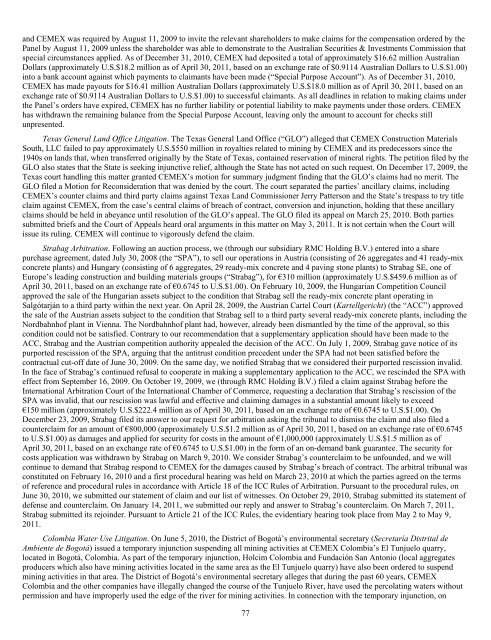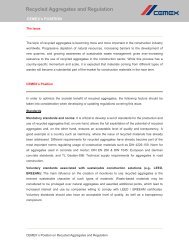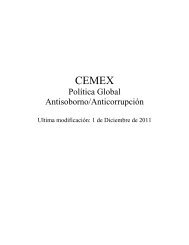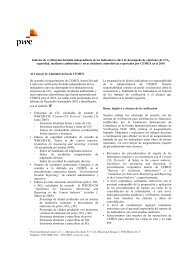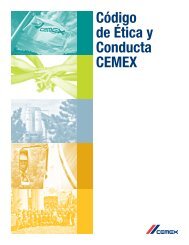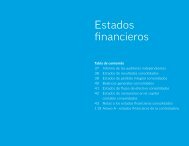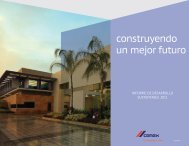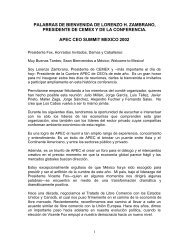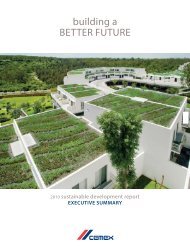building a STRONGER foundation - Cemex
building a STRONGER foundation - Cemex
building a STRONGER foundation - Cemex
Create successful ePaper yourself
Turn your PDF publications into a flip-book with our unique Google optimized e-Paper software.
and CEMEX was required by August 11, 2009 to invite the relevant shareholders to make claims for the compensation ordered by the<br />
Panel by August 11, 2009 unless the shareholder was able to demonstrate to the Australian Securities & Investments Commission that<br />
special circumstances applied. As of December 31, 2010, CEMEX had deposited a total of approximately $16.62 million Australian<br />
Dollars (approximately U.S.$18.2 million as of April 30, 2011, based on an exchange rate of $0.9114 Australian Dollars to U.S.$1.00)<br />
into a bank account against which payments to claimants have been made (“Special Purpose Account”). As of December 31, 2010,<br />
CEMEX has made payouts for $16.41 million Australian Dollars (approximately U.S.$18.0 million as of April 30, 2011, based on an<br />
exchange rate of $0.9114 Australian Dollars to U.S.$1.00) to successful claimants. As all deadlines in relation to making claims under<br />
the Panel’s orders have expired, CEMEX has no further liability or potential liability to make payments under those orders. CEMEX<br />
has withdrawn the remaining balance from the Special Purpose Account, leaving only the amount to account for checks still<br />
unpresented.<br />
Texas General Land Office Litigation. The Texas General Land Office (“GLO”) alleged that CEMEX Construction Materials<br />
South, LLC failed to pay approximately U.S.$550 million in royalties related to mining by CEMEX and its predecessors since the<br />
1940s on lands that, when transferred originally by the State of Texas, contained reservation of mineral rights. The petition filed by the<br />
GLO also states that the State is seeking injunctive relief, although the State has not acted on such request. On December 17, 2009, the<br />
Texas court handling this matter granted CEMEX’s motion for summary judgment finding that the GLO’s claims had no merit. The<br />
GLO filed a Motion for Reconsideration that was denied by the court. The court separated the parties’ ancillary claims, including<br />
CEMEX’s counter claims and third party claims against Texas Land Commissioner Jerry Patterson and the State’s trespass to try title<br />
claim against CEMEX, from the case’s central claims of breach of contract, conversion and injunction, holding that these ancillary<br />
claims should be held in abeyance until resolution of the GLO’s appeal. The GLO filed its appeal on March 25, 2010. Both parties<br />
submitted briefs and the Court of Appeals heard oral arguments in this matter on May 3, 2011. It is not certain when the Court will<br />
issue its ruling. CEMEX will continue to vigorously defend the claim.<br />
Strabag Arbitration. Following an auction process, we (through our subsidiary RMC Holding B.V.) entered into a share<br />
purchase agreement, dated July 30, 2008 (the “SPA”), to sell our operations in Austria (consisting of 26 aggregates and 41 ready-mix<br />
concrete plants) and Hungary (consisting of 6 aggregates, 29 ready-mix concrete and 4 paving stone plants) to Strabag SE, one of<br />
Europe’s leading construction and <strong>building</strong> materials groups (“Strabag”), for €310 million (approximately U.S.$459.6 million as of<br />
April 30, 2011, based on an exchange rate of €0.6745 to U.S.$1.00). On February 10, 2009, the Hungarian Competition Council<br />
approved the sale of the Hungarian assets subject to the condition that Strabag sell the ready-mix concrete plant operating in<br />
Salgótarján to a third party within the next year. On April 28, 2009, the Austrian Cartel Court (Kartellgericht) (the “ACC”) approved<br />
the sale of the Austrian assets subject to the condition that Strabag sell to a third party several ready-mix concrete plants, including the<br />
Nordbahnhof plant in Vienna. The Nordbahnhof plant had, however, already been dismantled by the time of the approval, so this<br />
condition could not be satisfied. Contrary to our recommendation that a supplementary application should have been made to the<br />
ACC, Strabag and the Austrian competition authority appealed the decision of the ACC. On July 1, 2009, Strabag gave notice of its<br />
purported rescission of the SPA, arguing that the antitrust condition precedent under the SPA had not been satisfied before the<br />
contractual cut-off date of June 30, 2009. On the same day, we notified Strabag that we considered their purported rescission invalid.<br />
In the face of Strabag’s continued refusal to cooperate in making a supplementary application to the ACC, we rescinded the SPA with<br />
effect from September 16, 2009. On October 19, 2009, we (through RMC Holding B.V.) filed a claim against Strabag before the<br />
International Arbitration Court of the International Chamber of Commerce, requesting a declaration that Strabag’s rescission of the<br />
SPA was invalid, that our rescission was lawful and effective and claiming damages in a substantial amount likely to exceed<br />
€150 million (approximately U.S.$222.4 million as of April 30, 2011, based on an exchange rate of €0.6745 to U.S.$1.00). On<br />
December 23, 2009, Strabag filed its answer to our request for arbitration asking the tribunal to dismiss the claim and also filed a<br />
counterclaim for an amount of €800,000 (approximately U.S.$1.2 million as of April 30, 2011, based on an exchange rate of €0.6745<br />
to U.S.$1.00) as damages and applied for security for costs in the amount of €1,000,000 (approximately U.S.$1.5 million as of<br />
April 30, 2011, based on an exchange rate of €0.6745 to U.S.$1.00) in the form of an on-demand bank guarantee. The security for<br />
costs application was withdrawn by Strabag on March 9, 2010. We consider Strabag’s counterclaim to be unfounded, and we will<br />
continue to demand that Strabag respond to CEMEX for the damages caused by Strabag’s breach of contract. The arbitral tribunal was<br />
constituted on February 16, 2010 and a first procedural hearing was held on March 23, 2010 at which the parties agreed on the terms<br />
of reference and procedural rules in accordance with Article 18 of the ICC Rules of Arbitration. Pursuant to the procedural rules, on<br />
June 30, 2010, we submitted our statement of claim and our list of witnesses. On October 29, 2010, Strabag submitted its statement of<br />
defense and counterclaim. On January 14, 2011, we submitted our reply and answer to Strabag’s counterclaim. On March 7, 2011,<br />
Strabag submitted its rejoinder. Pursuant to Article 21 of the ICC Rules, the evidentiary hearing took place from May 2 to May 9,<br />
2011.<br />
Colombia Water Use Litigation. On June 5, 2010, the District of Bogotá’s environmental secretary (Secretaría Distrital de<br />
Ambiente de Bogotá) issued a temporary injunction suspending all mining activities at CEMEX Colombia’s El Tunjuelo quarry,<br />
located in Bogotá, Colombia. As part of the temporary injunction, Holcim Colombia and Fundación San Antonio (local aggregates<br />
producers which also have mining activities located in the same area as the El Tunjuelo quarry) have also been ordered to suspend<br />
mining activities in that area. The District of Bogotá’s environmental secretary alleges that during the past 60 years, CEMEX<br />
Colombia and the other companies have illegally changed the course of the Tunjuelo River, have used the percolating waters without<br />
permission and have improperly used the edge of the river for mining activities. In connection with the temporary injunction, on<br />
77


